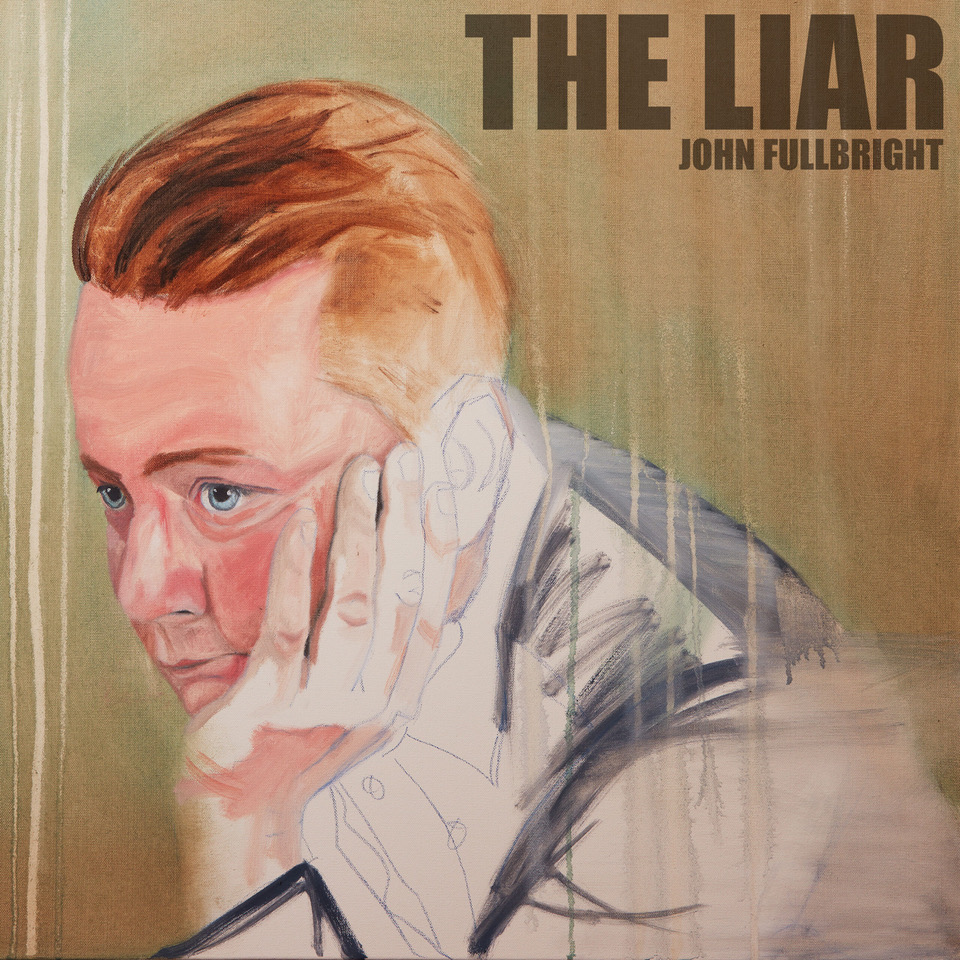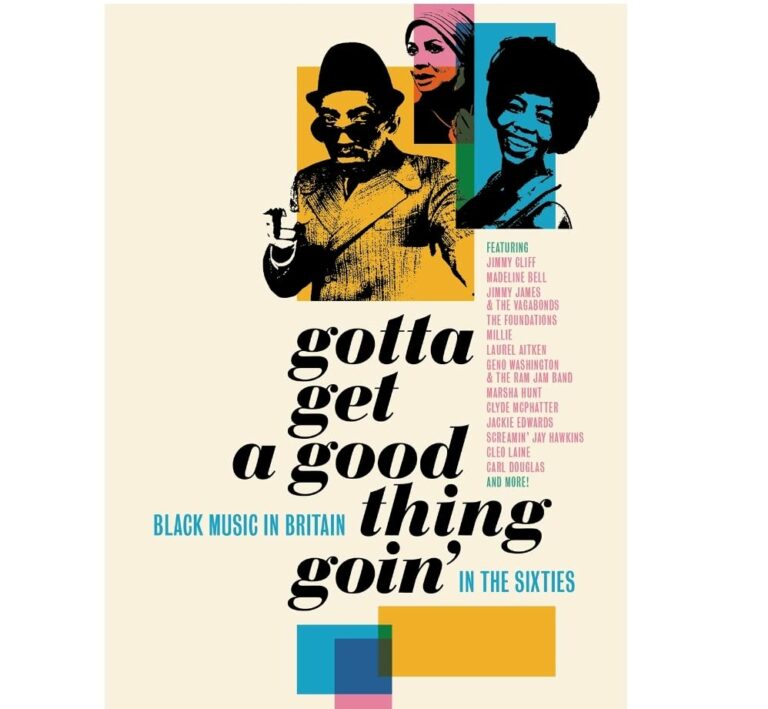Gotta Get a Good Thing Goin’ – Black Music in Britain in the Sixties is more expansive than its title might suggest. For one thing, “Black music” is a big umbrella; this four-CD set features not only R&B, soul, blues, reggae, and Motown-influenced tracks, but also a bit of pop and folk. In addition, rather than limit himself to British artists, compiler John Reed opted to include many performers from the U.S., the Caribbean, and elsewhere who moved to England or recorded there. “Nothing But a Heartache,” for example, is by the Flirtations, a South Carolina trio that arrived in London in 1967. The song, which sounds a lot like the work of Martha Reeves and the Vandellas, was a Top 40 hit in the U.S. but not in the U.K.
While this anthology is all over the place stylistically and geographically, it is consistently very good to great in quality, which is especially impressive considering how much of it there is. The CDs – which come encased in a hardcover book with copious liner notes – offer well over five hours of music and 115 songs. Incidentally, only 26 of them come from the first half of the sixties; the rest are from 1965 on, including two tracks recorded in 1969 and released early the following year.
Of course, that’s the era when the British Invasion hit America’s shores, but none of the major “invaders” are here: almost all of them were white artists (many of whom – like most of the performers in this set – were influenced by Black musicians from the States). As such, much of this should come as a revelation to U.S. listeners. In fact, even those who grew up in the U.K. are in for surprises because many of the acts included in this set never had a hit there or anywhere; and even those that did are represented by obscurities rather than their well-known numbers. You’ll spot a handful of familiar names – Jimmy Cliff, Clyde McPhatter, Shirley Bassey, and Otis Spann, for instance – but you probably haven’t heard the songs of theirs that are featured here.
You’ll also know some of the tunes, but not from these versions. Phil Spector’s “To Know Him Is to Love Him,” his early hit with the Teddy Bears, shows up here by a group called Cleo that sounds a lot like the Shirelles. Brian Wilson and Mike Love’s “I’m Waiting for the Day,” which featured on the Beach Boys’ classic Pet Sounds, appears in a recording by a group called Peanut, and the Beatles’ “Hey Jude” is almost unrecognizable in an infectious rendition by Nigerian singer Ambrose Campbell. Maxine Nightingale, who later had a big international hit with “Right Back Where We Started From,” serves up a cover of Blood, Sweat & Tears’ “Spinning Wheel.”
Many of these songs deserved the hit status that eluded them. The well-orchestrated and beautifully sung “Come On Home,” by Jamaican artist Jackie Edwards, exudes the sort of infectiousness that often leads to the Top 10. Oliver Norman’s “Drowning in My Own Despair” sounds a lot like the Four Tops – and just as good. Madeleine Bell, who worked as a backup singer for artists such as Dusty Springfield, is also on par with the best of Motown in “Picture Me Gone.” Ditto “This Heart of Mine” by Jimmy James.
Dorris Henderson, a folksinger who moved to the U.K. from Florida, beautifully delivers “Watch the Stars,” with acoustic guitar accompaniment by future Pentangle member John Renbourn. “Worried Over Me” is a soulful reggae number from a British session band called the Classics. Sixteen-year-old Lorraine Child’s “You,” which Rolling Stones manager/producer Andrew Long Oldham co-wrote, is catchy girl-group pop.
And there’s lots more where those tracks came from.
Compiler Reed writes in the liner notes that he hopes the collection provides a sense of “the sheer variety of talent and musical styles on offer from Black artists in Britain” in the sixties. That’s exactly what it does.
Also Noteworthy

Elliott Murphy, Wonder. Singer/songwriter Elliott Murphy’s latest album is his first studio collection of new original rock songs since 2017’s Prodigal Son. It’s also one of the best things in his catalog, which embraces dozens of records dating all the way back to 1974 when he debuted with the excellent Aquashow.
Like all of Murphy’s many fine albums, this one is built on a foundation of indelible melodies, the singer’s commanding vocal work, and a rich lyrical landscape replete with sociocultural references to everything from Ike and Tina Turner and TV’s Johnny Carson to Better Call Saul to an Alfa Romeo.
Wonder also benefits from the production and arrangements by Murphy’s son, Gaspard, and a full-band backup. As usual, long-time musical companion Olivier Durand (who co-wrote three tracks) is front and center on acoustic and electric guitars. Leo Cotton is also a large and welcome presence on piano and organ, as is violinist Melissa Cox on several tracks. There’s a great part on the final track by clarinetist Michel Fehrenbach and an emphasis on rhythm throughout, courtesy not only of a drum kit but also tambourine, congas, maracas, and bongos.
Written mostly during the pandemic’s early days, the album includes two tracks with the word “lonely” in their titles and references to the fragility of life and the inevitability of its end. But this is by no means a melancholy record. On the contrary, Murphy’s mood is hopeful, and the music is consistently upbeat, smile-inducing, and, on standouts like “Lack of Perspective,” downright exhilarating.

John Fullbright, The Liar.Oklahoma singer/songwriterJohn Fullbright’s first studio album, 2012’s From the Ground Up, garnered critical praise and a Grammy nomination, and the follow-up, 2014’s Songs, which also earned high marks from critics, made the Top 20 on some folk, rock, and indie charts.
Despite these auspicious signs, an eight-year recording lapse followed. Fullbright performed sporadically and did some producing, notably for North Carolina–based American Aquarian, but he recorded no new albums. The reasons are unclear: he referred in one interview to being “under pressure” and to alternating between feeling “terrified” and “overconfident,” and several possibly autobiographical songs here allude to a reliance on whiskey and wine.
Be that as it may, Fullbright is back with a mesmerizing album of solidly constructed, passionately sung songs, some old (such as “Unlocked Doors, which appeared on 2009’s Live at the Blue Door), some new, and all marking this artist as a major contender in the folk-rock world.
Fullbright has suggested that he has let go of a lot of his old rules about songwriting and has also opened himself up to more of a collaborative approach with bandmates. Whatever, he has crafted a must-hear record jam-packed with insightful, cliché-free lyrics, killer electric guitar, and vocals that are as powerful as anything that ever issued from the late Warren Zevon, whom he sometimes recalls. Fullbright seems to be baring his soul on The Liar, and every track resonates with emotion.
Jeff Burger’s website, byjeffburger.com, contains five decades’ worth of music reviews, interviews, and commentary. His books include Dylan on Dylan: Interviews and Encounters, Lennon on Lennon: Conversations with John Lennon, Leonard Cohen on Leonard Cohen: Interviews and Encounters, and Springsteen on Springsteen: Interviews, Speeches, and Encounters.



